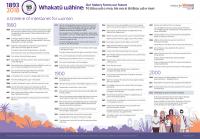The state of suffrage: Famous New Zealand women reflect
Today, Aotearoa, New Zealand is ablaze with hope. Multiple events, celebrations and organisations have rallied behind the #suffrage125 label to commemorate the valiant efforts of our foremother suffragists, winning the vote (20 voted for, 18 against) in our young parliament, in 1893.
The New Zealand Human Rights Commission filmed the video above, with some formidable New Zealand heroes who have carved the way for women in the 21st Century. Just what do they think of the current state of affairs for women in Aotearoa?
Violence against women
The Honourable Justice Dame Susan Glazebrook (DNZM), Judge of the Supreme Court of New Zealand says 'Generally, I think the suffragists would be horrified by the sorts of human rights issues faced by women and their families that still exist in New Zealand.'
Helen Clark (ONZ), the first elected female Prime Minister of New Zealand, concurs.
She says that while the international campaign #MeToo has exposed forms of men's violence and harassment in the workplace against women, (as #churchtoo has done within religious institutions), that 'the violence in the home is extremely worrying.'
Helen urges us to consider a national reflection on violence against women 'as a remaining serious blight on many women in being able to realise their aspirations'. What would New Zealand look like if women and children didn't live in fear in their own homes, and men had access to new ways of life, in the channeling of violence and aggression?
De facto discrimination
'We have largely achieved legal equality, there are very few black letter laws that discriminate against women ... but the de facto equality, we're far from that', Hon. Dame Silvia Cartwright (PCNZM, DBE, QSO), former Governor General of New Zealand, declares. Being the first woman in many spheres of the court system has proved a crystalizing task for Dame Silvia, who is internationally recognised for her ability and fortitude. How long until women are no longer the minority in percentages of government roles and leadership?
Michele A'Court, a famous comedian, writer and social commentator, points out that while we may have greater freedom to enter into public spheres of life than 125 years ago, we are perhaps no safer. 'Women are under a voluntary curfew.' 'We don't go out alone, and sometimes don't go out. There are places we don't go to.'
What does this mean, that still many young women are urged to travel in pairs, watch the 'signals' they send, the drinks they consume and the places they choose to exist in to avoid rape and assault?
The (not mythical!) gender pay gap
'On 15 August 2018, StatsNZ announced that the gender pay gap was 9.2 percent. The gender pay gap has reduced since 1998 (16.3 percent), but has stalled in the last decade.' - Ministry for Women on the Gender Pay Gap
Paula Tesoriero (MNZM), Disability Rights Acting Chief Commissioner and Paralympic Gold Medalist, says, 'Disabled women in New Zealand fall far short of equality with other females on a range of areas, particularly employment.'
Hilary Barry, one our nation's most beloved broadcast journalists, states, 'There is a problem with women being paid equally for equal work, and it's even worse for Māori and Pasifika women, and it's simply not fair, and we need to right that wrong.' What will it take for us to gain representation in the workplace and break down pay-barriers in 'feminised' work? How can we create a culture that doesn't pigeonhole men and women into 'traditional' roles–roles that have traditionally been to the political, personal and economic detriment of women?
Our hope of a better future
'Dominant groups in society need to create space and bring our women, bring us to the table, so we can create better spaces for all women' - Sina Wendt-Moore, CEO Leadership NZ and co-president YWCA Aotearoa New Zealand.
Check out the Ministry for Women's infographic at the bottom of the page, charting the status of women in 1893 compared to 2018. It asks 'What's in our future?'.
Questions around the gender pay gap, diversity, education, career pathways and increasing women's political and economic power–especially crucial for Māori and Pacific women–inspire us to consider all the ways we can forge a better path.
As The Salvation Army takes frank stock of the ways we have presented leadership opportunities for women within our ordained (officer) ranks and organisation, we look forward to what God will do as we uncover our radical, transformational, egalitarian roots. We need only look to our orders and regulations to see the hope embedded in our movement.
- 'One of the leading principles of The Army is the right of woman to an equal share with man in the great work of publishing Salvation to the world. By an unalterable provision of The Army’s Deeds Poll she can hold any position of authority or power in The Army from that of a Local Officer to that of General.
- This principle must be observed by all Field Principle Officers in their dealings with women. It is founded and maintained, upon the claims and sanction of the Bible on woman’s behalf, and upon the remarkable ability she possesses for managing the affairs of the War, and for influencing the hearts and consciences of the people for God.
- Moreover, the large part woman has played in The Army’s history, the enormous influence which the exercise of her gifts and her self-sacrificing labours have won for The Army, should secure for her in the future that place in its councils and campaigns which she has enjoyed in the past. Only a mean spirit of envy and jealousy, hateful to God and man, will allow her to toil in the background, and deprive her of the honours and the recognition to which she is entitled.' - Orders and Regulations of Field Officers of The Salvation Army
We have the black letter of New Zealand's law and The Salvation Army's Orders and Regulations to hearken to, but we look to the Holy Spirit to make sure there is no stone left unturned and no attitude that remains untransformed, as we strive to be the Body of Christ that brings God honour.
We look forward to seeing the innovative ways that our resilient nation answers the continued call to equality for women. We anticipate the many and various ways the women of The Salvation Army continue to meet the times with great courage.
And we join with the rest of Aotearoa, New Zealand to urge 'Whakatū wāhine – women stand up!' and declare that the best is yet to come.



